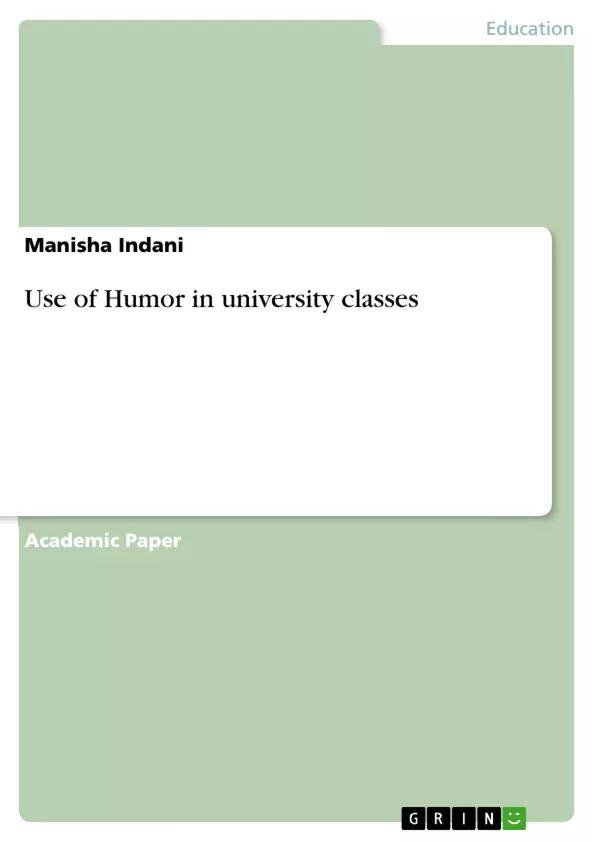Today’s teaching–learning process should be such that students should enjoy it. Today, syllabus, project work, tuitions, classes, dissertations, test tutorials and seminars impose lot of stress and tensions on the students. The purpose of this research paper was to study the effect of Sense of Humors in teaching Educational Research to M.Ed. students. The Lecture cum Sense of Humor Method and Lecture Method of teaching Educational Research were compared with each other. In all 70 M. Ed. students were selected for the study. Two levels of treatment were assigned randomly to the selected two groups. Jokes, cartoons, exaggerations, SMS etc. were introduced in experimental group. It was found that the Lecture cum Sense of Humor Method of Teaching Educational Research was found significantly effective than Lecture Method of Teaching Educational Research.
Inhaltsverzeichnis (Table of Contents)
- Abstract
- 1.0 Introduction:
- 2.0 RATIONLE
- 3.0 Objectives:
- 4.0 Hypothesis:
- 5.0 Sample:
- 6.0 Design:
- 7.0 Variables:
- 8.0 Tools:
- 9.0 Procedure of Data collection:
Zielsetzung und Themenschwerpunkte (Objectives and Key Themes)
This research paper aims to investigate the effectiveness of using humor in teaching Educational Research to M.Ed. students. The study compares the Lecture cum Sense of Humor Method with the traditional Lecture Method by analyzing the impact on students' achievement scores.
- Effectiveness of Sense of Humor in Teaching
- Impact of Humor on Student Learning and Retention
- Comparison of Teaching Methods: Lecture cum Sense of Humor vs. Traditional Lecture
- Improving Student Engagement and Motivation in Educational Research Courses
- Creation of Positive Learning Environments
Zusammenfassung der Kapitel (Chapter Summaries)
- Abstract: Provides a brief overview of the research study, outlining the research question, methods, and findings.
- 1.0 Introduction: Introduces the importance of engaging teaching methods in today's educational landscape and highlights the challenges faced by students in traditional learning environments. The need for innovative strategies like humor is emphasized.
- 2.0 Rationale: Discusses the growing recognition of humor's benefits in various fields, including education. Research findings on the positive impact of humor on communication, stress reduction, and learning are presented.
- 3.0 Objectives: States the specific objectives of the research study, including the development of humorous examples for teaching Educational Research and the comparison of student achievement scores across different teaching methods.
- 4.0 Hypothesis: Outlines the hypothesis to be tested in the study, which assumes no significant difference in achievement scores between students taught using Lecture cum Sense of Humor Method and Lecture Method.
- 5.0 Sample: Describes the selection process for the sample of M.Ed. students from two colleges in Jalgaon city. The sample is divided into experimental and control groups for the study.
- 6.0 Design: Explains the experimental design used in the study, which employs a Post Test Control Group Design to compare the effectiveness of different teaching methods.
- 7.0 Variables: Identifies the independent and dependent variables in the study, including Teaching Methods (Lecture cum Sense of Humor and Lecture) and student Achievement Scores, respectively.
- 8.0 Tools: Describes the tools used for data collection, including a standardized Intelligence Test and a researcher-developed Achievement Test in Educational Research.
- 9.0 Procedure of Data collection: Outlines the data collection process, including the development of humorous examples and the implementation of the experimental treatment. The use of a non-verbal Intelligence Test and the Achievement Test for data collection is detailed.
Schlüsselwörter (Keywords)
The primary keywords and focus topics of this research paper include: teaching methods, educational research, sense of humor, student engagement, achievement scores, learning environments, innovative teaching, M.Ed. students, and experimental study. The research examines the effectiveness of incorporating humor into teaching Educational Research to enhance student learning and achieve better outcomes.
Frequently Asked Questions
How does humor affect learning in university classes?
Research indicates that humor can significantly improve student engagement, reduce stress, and enhance the retention of complex educational material.
What is the "Lecture cum Sense of Humor Method"?
It is a teaching approach where traditional lectures are supplemented with jokes, cartoons, exaggerations, and humorous examples to make the content more relatable and enjoyable.
Was the use of humor proven effective in teaching Educational Research?
Yes, the study found that M.Ed. students taught with the humor-integrated method achieved significantly higher scores than those taught with the traditional lecture method.
What types of humor were used in the study?
The experimental group was introduced to various humorous elements, including jokes, cartoons, exaggerations, and SMS-style humor related to the subject matter.
Who participated in this research study?
The study involved 70 M.Ed. students from colleges in Jalgaon city, divided into experimental and control groups.
- Quote paper
- Dr. Manisha Indani (Author), Use of Humor in university classes, Munich, GRIN Verlag, https://www.grin.com/document/1060762



